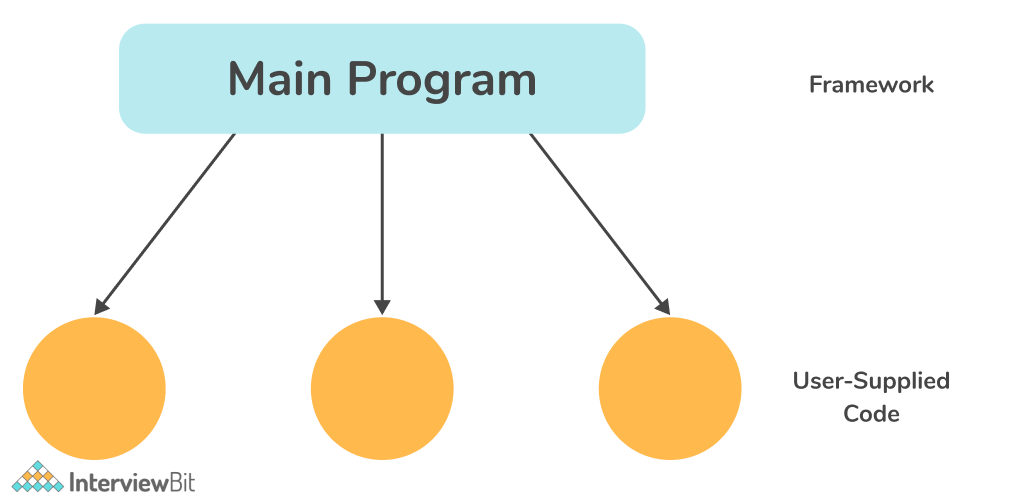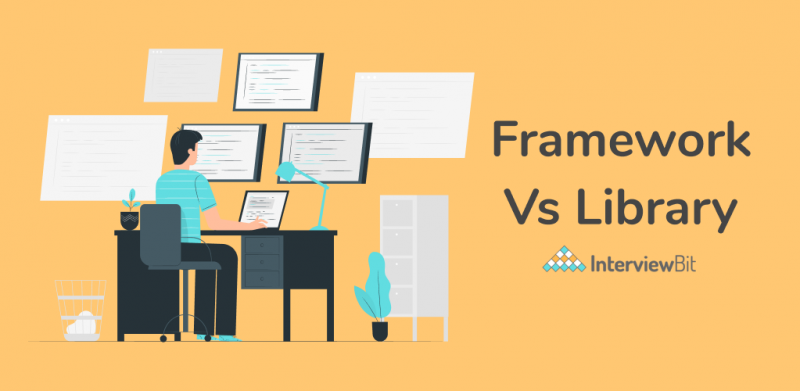To begin building an enterprise application, a software lead must decide what library or framework to use. In light of this, an obvious question arises: What’s the difference between a framework and a library?
Library is like building your home from the ground up. The house can be made in any style you prefer and the rooms can be arranged and decorated however you like. Framework, on the other hand, is like buying a new home. The house is already built, so you don’t have to worry about building problems, but you can’t choose how the rooms are arranged.
Most programmers and developers use hundreds of frameworks and libraries throughout their careers, but when asked this question, they reply, “A framework is just a collection of libraries,” but this is not entirely accurate.
Confused about your next job?
In developing applications, libraries and frameworks play a key role. Essentially, both the library and the Framework are reusable pieces of code written by developers to solve complicated problems. What differentiates the two terms is “Who’s calling whom”. Before we dive into the details of how libraries and frameworks differ, let’s take a look at both terms in more detail.
What is a Framework?

Developers need not start from scratch when they have tools to assist them like Frameworks. A framework is like the foundation upon which developers build applications for specific platforms. It includes reusable pieces of code written to perform common tasks and uses code provided by a developer for custom functionality. The framework may include defined and undefined objects and functions that developers can use to create applications. In that way, we can add significant functionality to the system by using existing code around the structure.
Frameworks combine resources like image files and reference documents into one package. It is thus possible to modify that package to fit specific project requirements. With a framework, developers can integrate new features into an application and give it new capabilities.

As you can see, the user-supplied code is plugged into the framework code and, thus, the framework controls the flow of the program.
Why do we use Frameworks?
Software development is a complex process. This involves a lot of phrases like coding, designing, testing, etc. When it comes to coding, developers must worry about syntax, declarations, garbage collection, statements, exceptions, and more. Software frameworks make development easier by providing a common platform from which developers can control all or most of the software development process.
Advantages
- Software frameworks are highly versatile, robust, and efficient due to the fact that they are often built, tested, and optimized by multiple software developers.
- Facilitates better programming practices and proper implementation of design patterns
- Avoiding duplicates and redundant code results in fewer bugs and a more consistent development process
- It would be possible to create one’s own software framework or contribute to an open-source framework. As a result, the functionality of software applications will continue to improve.
- Numerous code segments and functionalities have been built in framework and tested in advance, which makes applications more reliable.
- Even developers who do not own the code can test and debug it
- Developing an application takes significantly less time as it provides code to perform common tasks and uses code provided by a developer for custom functionality.
- As a result of using a software framework, you can focus on high-level functionalities, while the low-level functions are handled by the framework itself.
What is a Library?

A library is a collection of prewritten code that can be used to simplify tasks. The term library simply refers to a collection of code that is reused repeatedly. It is essentially a set of pre-defined functions and classes that programmers can use to simplify their work and speed up the development process. So, developers do not have to write code to accomplish specific functionality because the library already includes code for those functionalities. Standard libraries are available with most programming languages, but programmers can also make their own custom libraries.
Usually, most libraries do not have a large size. Generally, libraries are focused on narrow scopes such as strings, sockets, and IO, etc., so their APIs are also small and require fewer dependencies. jQuery, NumPy, etc. are examples of libraries.

As you can see, the library code is plugged into the user-supplied code and, thus, you can control the flow of the program.
Why do we need a library?
There is only one answer to this question, and that is to reuse the code that has already been written by someone else (or another developer). Developers can avoid writing code for functionality that is already written in the library by using it. The result is more efficiency and less time spent on coding. Since it’s more likely that other people are using it too, you’ll benefit from them finding and fixing any bugs. This is one of the reasons libraries are useful.
Key Differences
Put simply, the “Inversion of Control” (IoC) describes the difference between a library and a framework. In some ways, you can think of a framework as a collection of libraries, but it’s entirely different. By using a library, you control the flow of the program. The library can be invoked whenever and wherever you like. Contrary to this, when you use a framework, the flow is controlled by the framework. The framework instructs you where to put your code, but it will call your code as required. Simply put, our code calls the library’s code, but in a framework, it’s the framework’s code that calls our code as shown in the below diagram.
Developers can invoke libraries to perform specific tasks by using components, classes, and methods. A framework, however, already provides code to perform common tasks and uses code provided by a developer for custom functionality.

Difference Between Library and Framework

The following are some other fundamental differences between Frameworks and Libraries:
| Parameters | Library | Framework |
| Definition | Libraries provide developers with predefined functions and classes to make their work easier and boost the development process. | Framework, on the other hand, is like the foundation upon which developers build applications for specific platforms. |
| Inversion of Control | By using a library, you can control the flow of the application and call the library. | In contrast, when you use a framework, the control is inverted, i.e., the framework controls the flow and calls your code. |
| Collection | Generally, libraries are a collection of helper modules, objects, classes, functions, message templates, pre-written code, etc. | Frameworks consist of a lot of APIs, compilers, toolsets, support programs, libraries, etc. |
| Code Modification | Codes in libraries are geared toward a particular program or to solve a specific development problem. Therefore, developers must modify library code to meet their needs. | Despite the fact that frameworks generate new codes for developers. These codes cannot be altered or modified later. Unlike libraries, frameworks do not allow users to modify their pre-written codes, so you don’t have to worry about deleting or changing them. |
| Scope | It is possible to call a library out of context. You may use the library wherever you see fit in your code. | On the other hand, you can only call and use what belongs to a Framework within the same Framework. |
| Function | In the program linking and binding process, they play an important role. | Using them, you can build and deploy applications in a standard way as the framework already provides code to perform common tasks and uses code provided by a developer for custom functionality. |
| Complexity | Having a library means understanding the functionality of each method, and it isn’t easy to create complex interactions since you need to call many methods to get the desired results. | Frameworks, on the other hand, embody the basic flow, and since plugins need to be added to code, it is easier to do the right modification. |
| Extensibility | Generally, libraries aren’t designed for extensibility; they are designed to accomplish a specific purpose. | Frameworks provide general functionality. Because of this, they are built to be extensible, which allows developers to incorporate app-specific features without modifying the framework’s source code. |
| Replaceable | It is easy to replace a library with another library. For instance, if you do not like the jQuery date picker library, you can use another date picker like a bootstrap date picker or pick date. | Frameworks are difficult to replace. If, for instance, you were using AngularJS to build your product, you cannot simply swap it out for another framework. It requires rewriting the entire codebase. |
| Performance | Less code is required to build libraries, which leads to faster loading times and better performance. | Developing a framework requires a lot of coding, which increases loading times and decreases performance. |
| Usage | The purpose of libraries is to perform a defined and specific task. Eg: Image manipulation, network protocols, math operations, etc. | Frameworks can be used for performing a wide range of tasks. Among these are Web application systems, plug-in managers, GUI systems, and so on. |
| Existing Projects | You can integrate libraries seamlessly into existing projects to add functionality. | Incorporating frameworks seamlessly into an existing project is impossible. Instead, frameworks should be used when starting a new project. |
| Benefits | Good code quality, reusability, and control, enhanced speed and performance of the program, etc. | Faster programming, support from the community, great support for MVC (Model View Controller) pattern, etc. |
| Examples | JQuery, React JS, etc. | Spring, NodeJS, AngularJS, Vue JS, etc. |
Conclusion
In general, libraries tell you what to do and frameworks let you know what to do. Frameworks are better than libraries, or vice versa; however, it is ultimately a matter of use cases and situations rather than the tool itself.
A framework can relieve you of the headache of dependency trees, what to use and what not to use, how to scaffold your application, and how to design it, but it doesn’t provide you with complete control over your application. It’s very useful if you need to develop something quickly for a client. Using libraries, on the other hand, allows you to design your own application tailored specifically to your needs; however, maintaining dependencies, updating individual libraries, and identifying if one is broken due to another, can be extremely time-consuming. Programming is a complex world, and while neither pattern is inherently better, you need to know which pattern is appropriate for the problem at hand.
FAQs
Which is better, a library or a framework?
You can probably already see if you have worked with both that normally, code libraries are used to solve a specific problem or to add a specific feature to your program. Frameworks, on the other hand, provide a much more generic and reusable approach. While neither pattern is inherently better, you need to know which pattern is appropriate for the problem at hand.
What is the difference between JS (JavaScript) libraries and frameworks?
JavaScript libraries differ from frameworks in that they contain prewritten code snippets that can be used (and reused) for common JavaScript functions. Unlike JavaScript libraries, JavaScript frameworks are a full toolkit for shaping and organizing your web application. Frameworks describe how developers design applications.
Is flask a framework or library?
Flask is a micro web framework written in Python that does not require any specific tools or libraries.
Is Ajax a framework?
Yes, an Ajax framework is a cross-browser framework that allows developers to easily develop Ajax-based internet applications.




